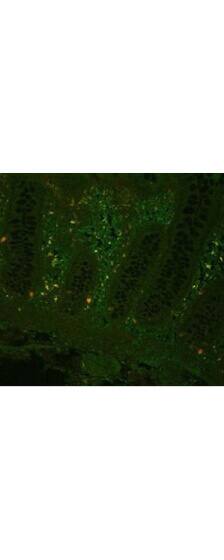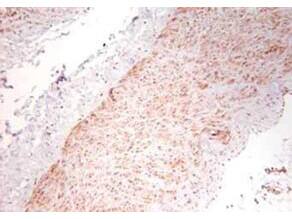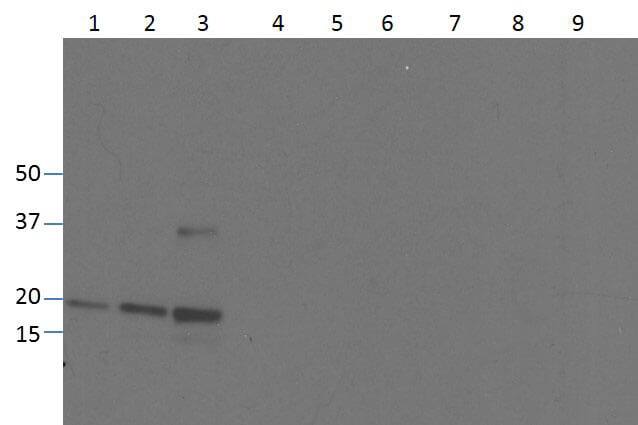TNF-alpha Antibody
Novus Biologicals, part of Bio-Techne | Catalog # NB600-587

Key Product Details
Validated by
Knockout/Knockdown
Species Reactivity
Validated:
Human, Mouse, Rat, Chicken, Primate
Cited:
Human, Mouse, Rat, Avian - Chicken
Applications
Validated:
ELISA, Immunocytochemistry/ Immunofluorescence, Immunohistochemistry, Immunohistochemistry-Paraffin, Western Blot
Cited:
Block/Neutralize, IF/IHC, Immunohistochemistry, Immunohistochemistry-Paraffin, Western Blot
Label
Unconjugated
Antibody Source
Polyclonal Rabbit Serum
Concentration
Please see the vial label for concentration. If unlisted please contact technical services.
Product Specifications
Immunogen
The whole rabbit serum was prepared by repeated immunizations with recombinant human TNF-alpha produced in E.coli. (Uniprot: P01375)
Reactivity Notes
Rat reactivity reported in scientific literature (PMID: 25894537), Mouse reactivity reported in scientific literature (PMID:22567116). Chicken reactivity reported in scientific literature (PMID: 30298003).
Localization
Type 2 membrane protein or soluble form derived from the membrane by proteolytic cleavage.
Specificity
The antiserum is directed against mature 17,000 MW human TNFa and is useful in determining its presence in various assays. In general, this antibody also detects primate TNFa in the same formats using similar dilutions. The antibody does not recognize human TNFb (lymphotoxin). This antiserum will recognize the cell-bound precursor of TNFa as a 26,000 protein in immunoblots, particularly in denatured samples. This antibody is also useful for neutralization of human and primate TNFa activity in bioassays. It does not neutralize the biological activity of lymphotoxin. For neutralization, it is recommended to incubate the sample with a 1:200 dilution of the antibody for at least 4 hours before being tested. A control of similarly diluted normal rabbit IgG is recommended.
Clonality
Polyclonal
Host
Rabbit
Isotype
Serum
Description
Store vial at -20C prior to opening. Aliquot contents and freeze at -20C or below for extended storage. Avoid cycles of freezing and thawing. Centrifuge product if not completely clear after standing at room temperature. This product is stable for several weeks at 4C as an undiluted liquid. Dilute only prior to immediate use.
Scientific Data Images for TNF-alpha Antibody
Western Blot: TNF-alpha AntibodyAzide Free [NB600-587]
Western Blot: TNF-alpha Antibody - Azide Free [NB600-587] - Analysis using Azide/BSA FREE version of NB600-587. Membrane blocked in 1% BSA-TBS-T 30 min RT, 1:1000 dilution in 1% BSA-TBS-T 4C.Western Blot: TNF-alpha AntibodyAzide Free [NB600-587]
Western Blot: TNF-alpha Antibody - Azide Free [NB600-587] - Expression of TNF-alpha, IL-1beta and NF-kappaB in the brains of MCAO rats. Western blot confirmed that protein levels of TNF-alpha increased as early as 4 h after reperfusion, further increased at 24 h, peaked at 72 h and decreased at 7 days, respectively (*P<0.001, compared with the controls; #P<0.001 compared with the previous time point). Five rats in each group were used for western blot (n=5), sham, sham-operated control rats Image collected and cropped by CiteAb from the following publication (https://www.nature.com/articles/cddis2014586), licensed under a CC-BY license.Immunocytochemistry/ Immunofluorescence: TNF-alpha Antibody - Azide Free [NB600-587]
Immunocytochemistry/Immunofluorescence: TNF-alpha Antibody - Azide Free [NB600-587] - LMP2 knockdown by shRNA reduced the expression of TNF-alpha and IL-1beta after MCAO. Immunofluorescence labeling revealed that both TNF-alpha and IL-1beta immunoreactivity was significantly upregulated in the ipsilateral ischemic hemisphere compared with sham-operated animals. In contrast, LMP2 knockdown by shRNA significantly reduced the expression of TNF-alpha and IL-1beta. Five rats in each group were used for immunofluorescent assays (n=5). Image collected and cropped by CiteAb from the following publication (https://www.nature.com/articles/cddis2014586), licensed under a CC-BY license.Applications for TNF-alpha Antibody
Application
Recommended Usage
ELISA
1:1000-1:5000
Immunocytochemistry/ Immunofluorescence
1:100
Immunohistochemistry
1:100-1:500
Immunohistochemistry-Paraffin
1:100-1:500
Western Blot
1:500-1:2000
Application Notes
This product has been tested for use in immunohistochemistry, immunofluorescence, and immunoblotting. It recognizes the 17,000 MW TNFalpha. Reactivity in other immunoassays is unknown.
Reviewed Applications
Read 1 review rated 5 using NB600-587 in the following applications:
Formulation, Preparation, and Storage
Purification
Whole Antiserum
Formulation
Antiserum
Preservative
No Preservative
Concentration
Please see the vial label for concentration. If unlisted please contact technical services.
Shipping
The product is shipped with polar packs. Upon receipt, store it immediately at the temperature recommended below.
Stability & Storage
Store at -20C short term. Aliquot and store at -80C long term. Avoid freeze-thaw cycles.
Background: TNF-alpha
TNF-alpha is critical for normal immune response; however, dysregulation of TNF-alpha production can result in various pathologies (2,4,5). Excessive production of pro-inflammatory cytokines including interleukin 1 (IL-1), IL-6, and TNF-alpha has been implicated in an array of autoimmune diseases like rheumatoid arthritis (RA), inflammatory bowel disease (IBD), and psoriasis (2,4,5). Anti-TNF monoclonal antibodies, including Infliximab, and soluble TNFR have been approved for the treatment of autoimmune and TNF-mediated diseases (5). Additionally, data suggests that TNF inhibitors can be beneficial for treating patients experiencing immune-related adverse events associated with immune checkpoint inhibitor cancer treatment (6).
References
1. Holbrook J, Lara-Reyna S, Jarosz-Griffiths H, McDermott M. Tumour necrosis factor signalling in health and disease. F1000Res. 2019;8:F1000 Faculty Rev-111. https://doi.org/10.12688/f1000research.17023.1
2. Jang DI, Lee AH, Shin HY, et al. The Role of Tumor Necrosis Factor Alpha (TNF-alpha) in Autoimmune Disease and Current TNF-alpha Inhibitors in Therapeutics. Int J Mol Sci. 2021;22(5):2719. https://doi.org/10.3390/ijms22052719
3. Horiuchi T, Mitoma H, Harashima S, Tsukamoto H, Shimoda T. Transmembrane TNF-alpha: structure, function and interaction with anti-TNF agents. Rheumatology (Oxford). 2010;49(7):1215-1228. https://doi.org/10.1093/rheumatology/keq031
4. Webster JD, Vucic D. The Balance of TNF Mediated Pathways Regulates Inflammatory Cell Death Signaling in Healthy and Diseased Tissues. Front Cell Dev Biol. 2020;8:365. https://doi.org/10.3389/fcell.2020.00365
5. Kalliolias GD, Ivashkiv LB. TNF biology, pathogenic mechanisms and emerging therapeutic strategies. Nat Rev Rheumatol. 2016; 12(1):49-62. https://doi.org/10.1038/nrrheum.2015.169
6. Chen AY, Wolchok JD, Bass AR. TNF in the era of immune checkpoint inhibitors: friend or foe?. Nat Rev Rheumatol. 2021;17(4):213-223. doi:10.1038/s41584-021-00584-4
Long Name
Tumor Necrosis Factor alpha
Alternate Names
Cachetin, DIF, TNF, TNF-A, TNFA, TNFalpha, TNFG1F, TNFSF1A, TNFSF2
Entrez Gene IDs
7124 (Human)
Gene Symbol
TNF
UniProt
Additional TNF-alpha Products
Product Documents for TNF-alpha Antibody
Product Specific Notices for TNF-alpha Antibody
This product is for research use only and is not approved for use in humans or in clinical diagnosis. Primary Antibodies are guaranteed for 1 year from date of receipt.
Loading...
Loading...
Loading...
Loading...
Loading...
![Western Blot: TNF-alpha AntibodyAzide Free [NB600-587] Western Blot: TNF-alpha AntibodyAzide Free [NB600-587]](https://resources.bio-techne.com/images/products/TNF-alpha-Antibody---Azide-Free-Western-Blot-NB600-587-img0014.jpg)
![Immunocytochemistry/ Immunofluorescence: TNF-alpha Antibody - Azide Free [NB600-587] Immunocytochemistry/ Immunofluorescence: TNF-alpha Antibody - Azide Free [NB600-587]](https://resources.bio-techne.com/images/products/TNF-alpha-Antibody---Azide-Free-Immunocytochemistry-Immunofluorescence-NB600-587-img0015.jpg)
![Immunohistochemistry: TNF-alpha Antibody - Azide Free [NB600-587] Immunohistochemistry: TNF-alpha Antibody - Azide Free [NB600-587]](https://resources.bio-techne.com/images/products/TNF-alpha-Antibody---Azide-Free-Immunohistochemistry-NB600-587-img0008.jpg)
![Western Blot: TNF-alpha AntibodyAzide Free [NB600-587] Western Blot: TNF-alpha AntibodyAzide Free [NB600-587]](https://resources.bio-techne.com/images/products/TNF-alpha-Antibody---Azide-Free-Western-Blot-NB600-587-img0012.jpg)
![Western Blot: TNF-alpha AntibodyAzide Free [NB600-587] Western Blot: TNF-alpha AntibodyAzide Free [NB600-587]](https://resources.bio-techne.com/images/products/TNF-alpha-Antibody---Azide-Free-Western-Blot-NB600-587-img0013.jpg)


